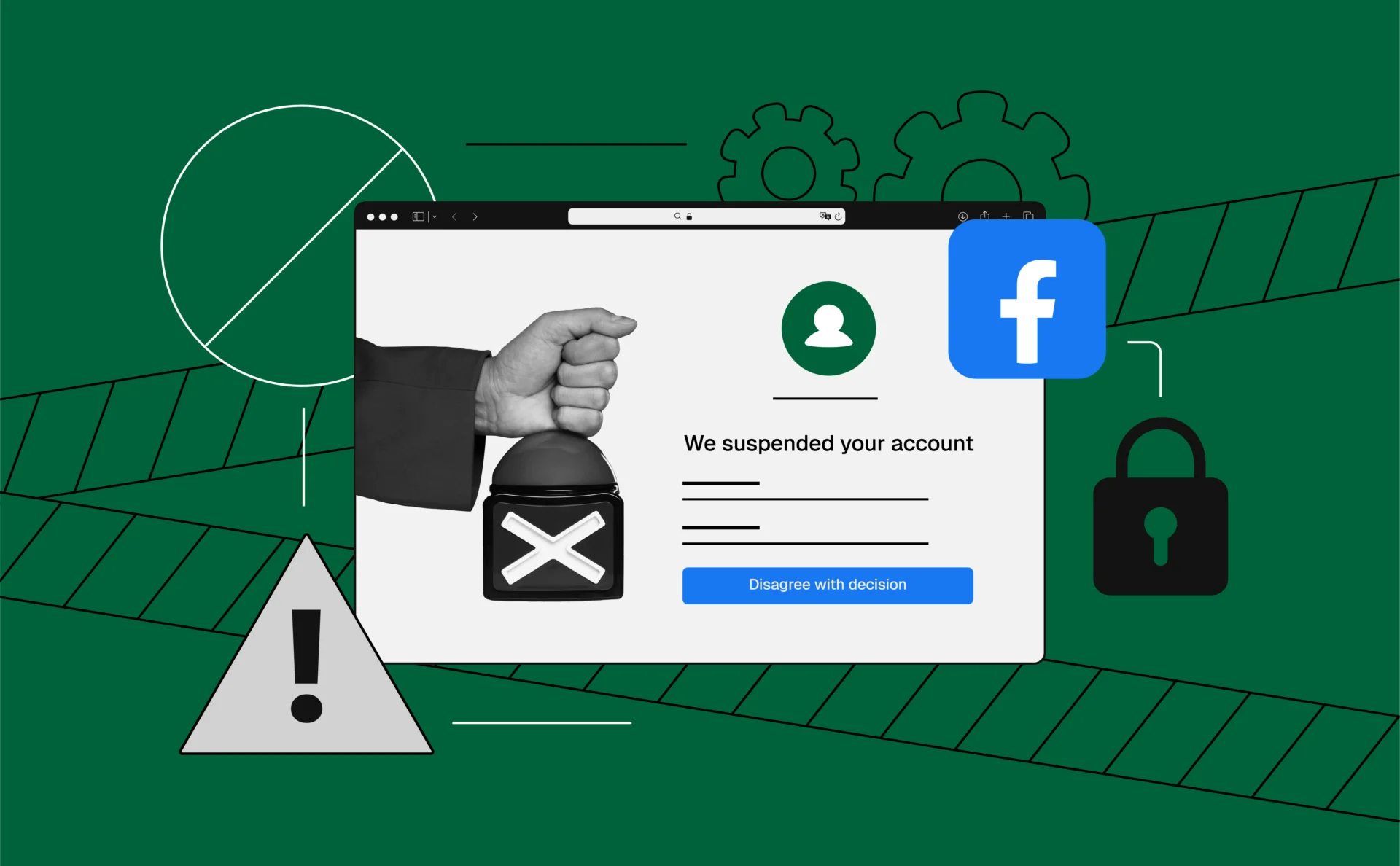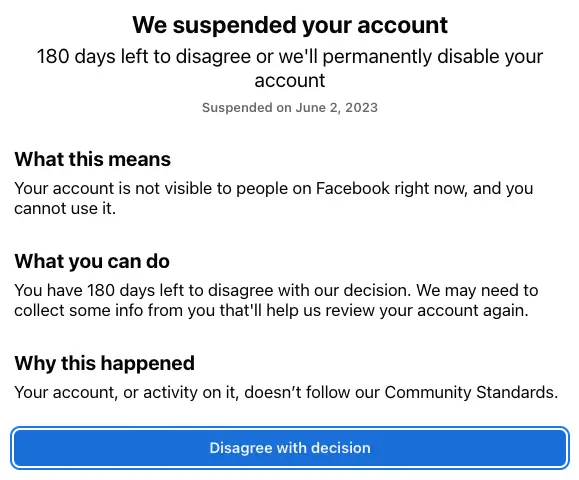
Why does Facebook keep suspending my account?
If you’re an active Facebook user, the last thing you want is to have your account suspended or locked. Many users find themselves in this frustrating situation, wondering, why does my Facebook keep getting suspended? You might have received a notification saying, “Facebook account suspended for no reason” or “Facebook account locked due to suspicious activity.” These messages can leave you confused and unsure about what went wrong. Fortunately, understanding the reasons behind these suspensions can help you avoid them and keep your account safe.
In this article, we’ll explore why Facebook suspends accounts, the different types of suspensions you might encounter, and most importantly, how you can protect your account from being suspended in the future.
Common reasons for Facebook account suspensions
Facebook takes user security and platform integrity seriously, which is why account suspensions are a common practice.

Here are some of the main reasons why Facebook might suspend your account:
1. Violating community standards
Facebook has strict community guidelines. If your account is found posting inappropriate content—whether it’s hate speech, harassment, or fake news—it can quickly get flagged. While most users are aware of what’s considered inappropriate, violations can happen unintentionally, especially when sharing posts or comments that go against Facebook’s rules. That can lead to your Facebook account being suspended.
2. Suspicious activity or automated behavior
One of the most common reasons for Facebook account being suspended for no reason is suspicious activity. Facebook may lock an account if it detects behavior that seems automated. For example, if you suddenly send out dozens of friend requests in a short period or engage in spamming, Facebook’s system may flag your actions as abnormal. Facebook might also say, “Facebook, we suspect automated behavior on your account.” This could happen even if you didn’t intend to do anything wrong.
3. Using fake information
Facebook requires that users provide real names and personal details. If you’re caught using fake information to create a profile—whether it’s a fake name, a fake birthday, or a temp Facebook account—you might find your account suspended. Facebook uses sophisticated algorithms to track fake accounts, so it’s best to stick with truthful details.
4. Sharing content that violates copyright
Posting content that violates copyright laws can lead to an account suspension. This includes sharing music, movies, or photos you do not own the rights to. Facebook has partnerships with content owners and often removes material that infringes on copyrights, sometimes suspending accounts that are repeatedly involved in this behavior.
5. Too many logins from suspicious locations
If Facebook notices that your account is being logged into from various locations or devices that are different from your usual login habits, it may lock your account temporarily for your security. Facebook might assume that someone else has accessed your account and could be attempting to misuse it.
Types of suspensions: temporary vs permanent
When your account is suspended, Facebook might impose either a temporary or permanent suspension depending on the nature of the violation.
Temporary suspension
A temporary suspension typically lasts anywhere from a few hours to 30 days. During this time, you won’t be able to access your Facebook account, and some features may be disabled. If the reason of your account being suspended is minor—such as a single violation of Facebook’s community standards—it is usually temporary. Once the suspension is lifted, you can resume using Facebook as normal.
Permanent suspension
A permanent suspension is much more serious and typically happens when Facebook believes that a user has violated its terms of service repeatedly or in a major way. Permanent suspensions are usually reserved for serious offenses, such as repeated instances of hate speech, inciting violence, or using the platform for illegal activities. If your account is permanently suspended, it’s much harder to get it reinstated, and you may need to go through a lengthy appeals process.
What happens when your Facebook account is for no reason?
When Facebook suspends your account, you’ll usually receive a notification outlining the reason behind it. This can help you understand what went wrong. For example, you might see messages like, “Facebook keeps suspending my account for spamming,” or “Facebook account suspended for no reason.”
If your account is suspended, the following steps are common:
Review the reason: Facebook typically provides a reason for the suspension. Check the notification for details.
- Appeal the decision: If you believe that your account was suspended by mistake, you can appeal the decision. Facebook allows users to submit an appeal through the Help Center. You’ll be asked to verify your identity and, in some cases, provide additional documentation.
- Wait for a response: After submitting an appeal, you’ll need to wait for Facebook to review the information. This can take anywhere from a few days to several weeks.
- Account recovery: If Facebook accepts your appeal, your account will be reinstated. However, if the suspension is permanent, you may have to create a new account.
How long does Facebook suspend your account?
The duration of a suspension depends on the severity of the violation and whether it’s a temporary or permanent suspension.
Temporary suspensions are often for 24 to 72 hours, but in some cases, Facebook can suspend your account for up to 30 days. These suspensions usually happen if you’ve violated minor rules or made a mistake (like spamming or accidental fake information).
Permanent suspensions occur when Facebook deems your actions as harmful or against their terms of service. There is no fixed time frame for a permanent suspension. Once your account is permanently suspended, it’s likely to stay that way unless you can successfully appeal the decision.
Tips to avoid Facebook account suspensions
If you don’t want to experience the frustration of a suspended account, here are some tips to help you stay on the safe side:
Follow Facebook’s community standards
This is the most important step you can take. Familiarize yourself with Facebook’s community guidelines, and make sure your posts and interactions align with their policies. Avoid sharing offensive, inappropriate, or misleading content.
Don’t engage in automated behavior
Automated actions like using bots to like or share posts can trigger Facebook’s security systems. Be cautious when using third-party apps or extensions that interact with Facebook, and always ensure that your behavior remains organic and natural.
Protect your account with strong security
Using a weak password or not enabling two-factor authentication can make your account vulnerable to hacking. Once a hacker gains access, they could engage in suspicious activity, which may lead to your account being locked. Ensure that your password is strong and unique, and enable two-factor authentication for extra security.
Avoid using fake information
If you’re using a temporary (temp) Facebook account or providing fake details, Facebook’s algorithms will likely catch you and might susp. Stick to using your real name, a legitimate profile picture, and honest details to avoid being flagged.
Limit friend requests and messages
Sending too many friend requests in a short period can trigger Facebook’s automated systems, which might flag your account as suspicious. If you’re building your friend list, do it gradually. Similarly, avoid spamming people with messages or posting too frequently in groups.
Verify your identity if prompted
If Facebook suspects that your account has been hacked, it might ask you to verify your identity. This could involve uploading a photo of your ID or going through other steps to confirm that you’re the real owner of the account.
What to do if your account keeps getting suspended
If you’ve found that Facebook keeps suspending my account, despite following all the guidelines, it could be worth checking your login history or even reviewing third-party apps that have access to your Facebook profile. Certain apps might trigger Facebook’s security systems and cause your account to be suspended. In such cases, you may need to disconnect these apps and review your account for any suspicious activity.
Final thoughts
Having your Facebook account suspended is a frustrating experience, but understanding why it happens and how to prevent it can help you avoid future issues. Whether it’s automated behavior, suspicious activity, or violating community guidelines, Facebook has a reason for locking your account. By following Facebook’s guidelines, securing your account, and being cautious about third-party apps, you can minimize the chances of facing the message “Facebook account suspended for no reason”.
If you’re dealing with a suspended account, remember that the appeals process exists for a reason. Be patient and provide as much information as possible to increase the chances of getting your account back.
Stay informed, stay safe, and protect your privacy online!